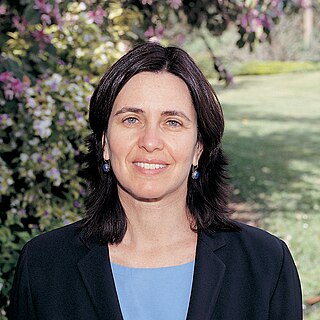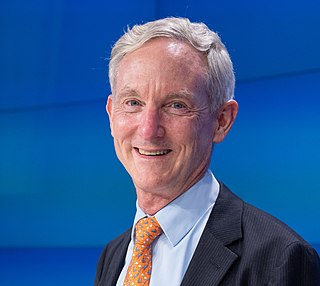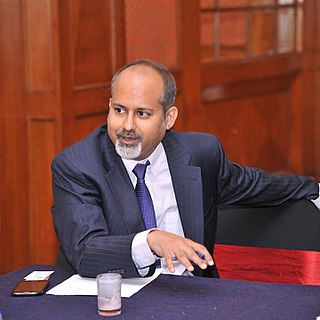Related Research Articles

Shafrira Goldwasser is an Israeli-American computer scientist and winner of the Turing Award in 2012. She is the RSA Professor of Electrical Engineering and Computer Science at Massachusetts Institute of Technology; a professor of mathematical sciences at the Weizmann Institute of Science, Israel; the director of the Simons Institute for the Theory of Computing at the University of California, Berkeley; and co-founder and chief scientist of Duality Technologies.

Jack Bonnell Dennis is an American computer scientist and Emeritus Professor of Computer Science and Engineering at Massachusetts Institute of Technology.

Charles Eric Leiserson is a computer scientist and professor at Massachusetts Institute of Technology (M.I.T.). He specializes in the theory of parallel computing and distributed computing.

Frank Thomson "Tom" Leighton is the CEO of Akamai Technologies, the company he co-founded with the late Daniel Lewin in 1998. As one of the world's preeminent authorities on algorithms for network applications and cybersecurity, Dr. Leighton discovered a solution to free up web congestion using applied mathematics and distributed computing.
Lennart Augustsson is a Swedish computer scientist. He was formerly a lecturer at the Computing Science Department at Chalmers University of Technology. His research field is functional programming and implementations of functional programming languages.
Bluespec, Inc. is an American semiconductor tool design company co-founded by Massachusetts Institute of Technology (MIT) professor Arvind in June 2003 and based in Framingham, Massachusetts. Arvind had formerly founded Sandburst in 2000, which specialized in producing chips for 10 Gigabit Ethernet (10GE) routers, for this task. Bluespec has two product lines which are primarily for application-specific integrated circuit (ASIC) and field-programmable gate array (FPGA) hardware designers and architects. Bluespec supplies high-level synthesis with register-transfer level (RTL). The first Bluespec workshop was held on August 13, 2007, at MIT.
Kalyanmoy Deb is an Indian computer scientist. Deb is the Herman E. & Ruth J. Koenig Endowed Chair Professor in the Department of Electrical and Computing Engineering at Michigan State University. Deb is also a professor in the Department of Computer Science and Engineering and the Department of Mechanical Engineering at Michigan State University.

Randal E. Bryant is an American computer scientist and academic noted for his research on formally verifying digital hardware and software. Bryant has been a faculty member at Carnegie Mellon University since 1984. He served as the Dean of the School of Computer Science (SCS) at Carnegie Mellon from 2004 to 2014. Dr. Bryant retired and became a Founders University Professor Emeritus on June 30, 2020.
Kanianthra Mani Chandy is the Simon Ramo Professor of Computer Science at the California Institute of Technology (Caltech). He has been the Executive Officer of the Computer Science Department twice, and he has been a professor at Caltech since 1989. He also served as Chair of the Division of Engineering and Applied Science at the California Institute of Technology.
Irvine Dataflow (Id) is a general-purpose parallel programming language, started at the University of California at Irvine in 1975 by Arvind and K. P. Gostelow. Arvind continued work with Id at MIT into the 1990s.
Hari Balakrishnan is the Fujitsu Professor of Computer Science and Artificial Intelligence in the Department of Electrical Engineering and Computer Science at MIT, and the Co-founder and CTO at Cambridge Mobile Telematics.

Jitendra Malik is an Indian-American academic who is the Arthur J. Chick Professor of Electrical Engineering and Computer Sciences at the University of California, Berkeley. He is known for his research in computer vision.

Guang R. Gao was a computer scientist and a Professor of Electrical and Computer Engineering at the University of Delaware. Gao was a founder and Chief Scientist of ETI.

Alan Stuart Edelman is an American mathematician and computer scientist. He is a professor of applied mathematics at the Massachusetts Institute of Technology (MIT) and a Principal Investigator at the MIT Computer Science and Artificial Intelligence Laboratory (CSAIL) where he leads a group in applied computing. In 2004, he founded a business called Interactive Supercomputing which was later acquired by Microsoft. Edelman is a fellow of American Mathematical Society (AMS), Society for Industrial and Applied Mathematics (SIAM), Institute of Electrical and Electronics Engineers (IEEE), and Association for Computing Machinery (ACM), for his contributions in numerical linear algebra, computational science, parallel computing, and random matrix theory. He is one of the cocreators of the technical programming language Julia.
Rajesh K. Gupta is a computer scientist and engineer, currently the Qualcomm Professor in Embedded Microsystems at University of California, San Diego. His research concerns design and optimization of cyber-physical systems (CPS). He is a Principal Investigator in the NSF MetroInsight project and serves as Associate Director of the Qualcomm Institute. His research contributions include SystemC and SPARK Parallelizing High-level Synthesis. Earlier he led NSF Expeditions on Variability in Microelectronic circuits.

Keshav K Pingali is an American computer scientist, currently the W.A."Tex" Moncrief Chair of Grid and Distributed Computing at the University of Texas at Austin, and also a published author. He previously also held the India Chair of Computer Science at Cornell University and also the N. Rama Rao Professorship at Indian Institute of Technology. He is a Fellow of the American Association for the Advancement of Science, Association for Computing Machinery and Institute of Electrical and Electronics Engineers. In 2020, he was elected a Foreign Member of the Academia Europeana.

Jayadev Misra is an Indian-born computer scientist who has spent most of his professional career in the United States. He is the Schlumberger Centennial Chair Emeritus in computer science and a University Distinguished Teaching Professor Emeritus at the University of Texas at Austin. Professionally he is known for his contributions to the formal aspects of concurrent programming and for jointly spearheading, with Sir Tony Hoare, the project on Verified Software Initiative (VSI).

Sandeep Kumar Shukla is currently Poonam and Prabhu Goel Chair Professor and previous head of Computer Science and Engineering Department, Indian Institute of Technology, Kanpur, India. He is currently the Editor-in-Chief of ACM Transactions on Embedded Systems, and associate editor for ACM transactions on Cyber Physical Systems. He is currently the joint director of C3i centre at IIT Kanpur along with Manindra Agrawal.
Rajat Moona is the Director of Indian Institute of Technology Gandhinagar from 2022 onwards. He is also serving as Director of Indian Institute of Information Technology, Vadodara on Additional Charge Basis from May 2023 onwards. He has served as director at Indian Institute of Technology, Bhilai from 2017 to 2022. He was also a professor of Computer Science and Engineering at IIT Kanpur from 1991 to 2011 and Director General of Centre for Development of Advanced Computing from 2009 to 2017.
References
- ↑ "National Academies News". National Academies.
- 1 2 3 4 "CSAIL, MIT". MIT.
- 1 2 "UMN News". University of Minnesota. Archived from the original on 18 June 2010.
- ↑ "MIT News Office". MIT. 28 October 1992.
- ↑ "Sandburst Corporation". Bloomberg Businessweek. Archived from the original on 5 October 2012.
- ↑ "About Bluespec". Bluespec. Archived from the original on 18 June 2010.
- ↑ Hudak, Paul; Hughes, John; Peyton Jones, Simon; Wadler, Philip Wadler (9–10 June 2007). "A history of Haskell: being lazy with class". HOPL III: Proceedings of the third ACM SIGPLAN conference on History of programming languages. San Diego, California: Association for Computing Machinery. pp. 12-1–12-55. doi:10.1145/1238844.1238856. S2CID 52847907.
[it] is basically Haskell with some extra syntactic constructs for the term rewriting system (TRS) that describes what the hardware does. The type system has been extended with types of numeric kind.
- ↑ Peyton Jones, Simon (June 2007). A History of Haskell: being lazy with class. Microsoft Research (Report).
- ↑ "Infosys Prize - Jury 2020". Infosys-science-foundation.com. Retrieved 9 December 2020.
- ↑ "N. Ramo Rao Chair Professor". IIT, Kanpur. Archived from the original on 27 September 2006.
- ↑ "Distinguished Alumni Award recipients". Department of Computer Science and Engineering. University of Minnesota. Retrieved 1 July 2022.
- 1 2 "CSAIL Arvind Biography". MIT.
- ↑ "Recipients of the Outstanding Achievement Award". University Awards and Honors. University of Minnesota. Retrieved 1 July 2022.
- ↑ "ACM Names Bluespec Founder Arvind 2006 ACM Fellow". EDACafe. Retrieved 1 July 2022.